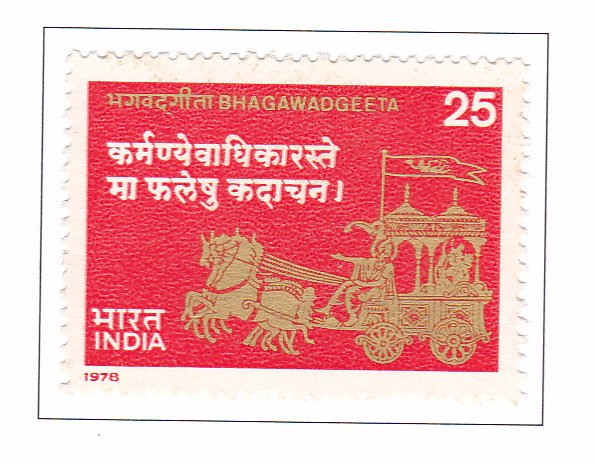“Bhagawad Geeta” (Divine Song of Lord India)

Technical Data
| Date of Issue | August 25, 1978 |
|---|---|
| Denomination | 25 p |
| Quantity | 5,000,000 |
| Perforation | comb 13½ x 13 |
| Printer | Security Printing Press, Nashik |
| Watermark | No Watermark |
| Colors | Multicolor |
| Catalog Codes |
Michel IN 767 Stamp Number IN 804 Yvert et Tellier IN 563 Stanley Gibbons IN 894 |
| Themes | Animals (Fauna) | Carriages | Commemoration | Gods and goddesses | Horses | Music |
The Bhagawad Geeta, the Divine Song of the Lord, appears in the Bhishma Parva of the great epic Mahabharata. It has been regarded as a scripture of the highest authority by great Acharyas like Shankara and Ramanuja, and as a practical guide to living by generations in India and abroad.
Mahatma Gandhi once said, “The Geeta is the universal mother. She turns away nobody. Her door is wide open to anyone who knocks. A true votary of the Geeta does not know what disappointment is. He ever dwells in perennial joy and peace that passeth understanding. But that peace and joy come not to the skeptic or to him who is proud of his intellect or learning. It is reserved only for the humble in spirit who brings to her worship a fullness of faith and an undivided singleness of mind. There never was a man who worshipped her in that spirit and went back disappointed.”
Lokmanya Tilak remarked, “The Geeta was not preached either as a pastime for persons tired out after living a worldly life in the pursuit of selfish motives, nor as a preparatory lesson for living such a worldly life, but in order to give philosophical advice as to how one should live one’s worldly life with an eye to Release, moksha, and as to the true duty of human beings in worldly life.”
Aldous Huxley noted, “The Geeta is one of the clearest and most comprehensive summaries of the perennial philosophy ever to have been done. Hence its enduring value, not only for Indians, but for all mankind.”
Madan Mohan Malaviya declared, “I believe in all the living languages of the world, there is no book so full of true knowledge, and yet so handy as the Bhagawad Geeta. It brings to men the highest knowledge, the purest love, and the most luminous action. It teaches self-control, the three-fold austerity, non-violence, truth, compassion, obedience to the call of duty for the sake of duty, and putting up a fight against unrighteousness (Adharma).”
The Posts and Telegraphs Department feels privileged to issue a special stamp in honor of the Bhagawad Geeta.
